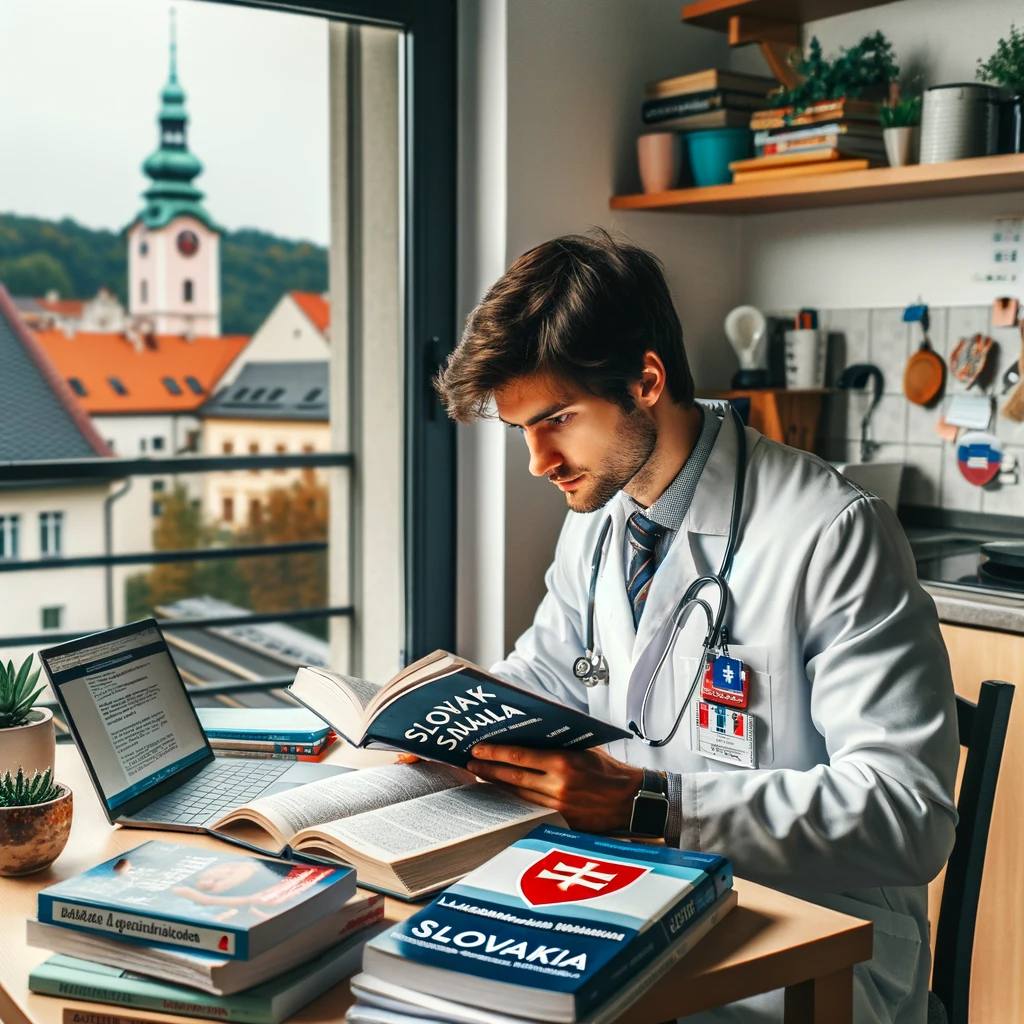In Slovakia, we have been solving the problem of a lack of professional medical personnel at all levels for a long time. We see a greater opening of the Slovak healthcare system to foreigners as one of the possible solutions, and at MALnS we have therefore always tried to find a way for them to achieve this. One of the main obstacles in the whole process is the knowledge of the language needed to pass the professional exam, but also to perform the profession itself. Here, we could describe Slovakia's approach to this issue as long-term indifferent (even rather negative), even though we have seen some positive changes in the recent period. Unfortunately, the reason for this is the biggest war conflict since the Second World War taking place in our neighbors, which drove millions of people from their homes and finally forced us to change something about this approach. After all, there are over a hundred thousand outcasts and a hundred thousand potential patients, and with their arrival, the problem began to be solved hastily, unconceptually and often amateurishly. Some amendments to the legislation were positive (e.g. the introduction and expansion of temporary professional internships for all health workers) as well as certain reliefs associated with the recognition of education (e.g. an apostille on a diploma is not required), but no one dealt with the conceptual preparation. It is true that several courses have been created, but mostly without any experience in teaching the Slovak language to foreigners. It is clear to all of us that preparing a doctor to pass a professional exam in Slovak is something different from teaching a foreigner to order food in a restaurant.
Since the whole problem has been intimately known to us for a long time, since its inception we have tried together with our partners to create a specialized 4-phase course focused on the language training of foreign health professionals. The goal of the course is not only preparation for the differential exams themselves, but also faster adaptation in the Slovak healthcare system and full use of the qualification.
Since 2022, we have been a partner of the international Medintegro (Erasmus+) project, the aim of which is to create a unified platform for the training of foreign health professionals for Slovakia, the Czech Republic and Latvia. The grant for the entire project is the accredited language school iCan, which has been focusing on teaching Slovak to foreigners since its foundation in 2016. Today, we have already finalized the entire 4-phase course and we would like to invite all health professionals to it, whether they are doctors or pharmacists , dentists or nurses. The ambition of the course is to teach foreign health professionals the Slovak language from the very beginning (1st and 2nd phase – general and medical Slovak) to mastering the differential exam and work in the health sector (3rd phase - preparation for differential exams and 4th phase – legal minimum for foreign health workers). Since the differential exams are different for nurses, doctors, pharmacists and dentists, our 3rd phase of the course is prepared in four variants exactly according to the type of health profession.
We would therefore like to invite everyone to the third and fourth phase courses, which we are opening on March 1, 2024.
We offer these two phases of the course to all participants with a 50% discount (of course, our members also get their 10% discount as an additional bonus). The price of the course is therefore 350 euros for both phases. Of course, everyone can sign up for the course, including those who already work in Slovakia and would like to improve their language skills. We also believe that the course will also be interesting for employers, who can significantly increase their efficiency and improve the overall atmosphere at the workplace by supporting their foreign workers in this way.
For more information and to register for the course, visit the site
Since the whole problem has been intimately known to us for a long time, since its inception we have tried together with our partners to create a specialized 4-phase course focused on the language training of foreign health professionals. The goal of the course is not only preparation for the differential exams themselves, but also faster adaptation in the Slovak healthcare system and full use of the qualification.
Since 2022, we have been a partner of the international Medintegro (Erasmus+) project, the aim of which is to create a unified platform for the training of foreign health professionals for Slovakia, the Czech Republic and Latvia. The grant for the entire project is the accredited language school iCan, which has been focusing on teaching Slovak to foreigners since its foundation in 2016. Today, we have already finalized the entire 4-phase course and we would like to invite all health professionals to it, whether they are doctors or pharmacists , dentists or nurses. The ambition of the course is to teach foreign health professionals the Slovak language from the very beginning (1st and 2nd phase – general and medical Slovak) to mastering the differential exam and work in the health sector (3rd phase - preparation for differential exams and 4th phase – legal minimum for foreign health workers). Since the differential exams are different for nurses, doctors, pharmacists and dentists, our 3rd phase of the course is prepared in four variants exactly according to the type of health profession.
We would therefore like to invite everyone to the third and fourth phase courses, which we are opening on March 1, 2024.
We offer these two phases of the course to all participants with a 50% discount (of course, our members also get their 10% discount as an additional bonus). The price of the course is therefore 350 euros for both phases. Of course, everyone can sign up for the course, including those who already work in Slovakia and would like to improve their language skills. We also believe that the course will also be interesting for employers, who can significantly increase their efficiency and improve the overall atmosphere at the workplace by supporting their foreign workers in this way.
For more information and to register for the course, visit the site





